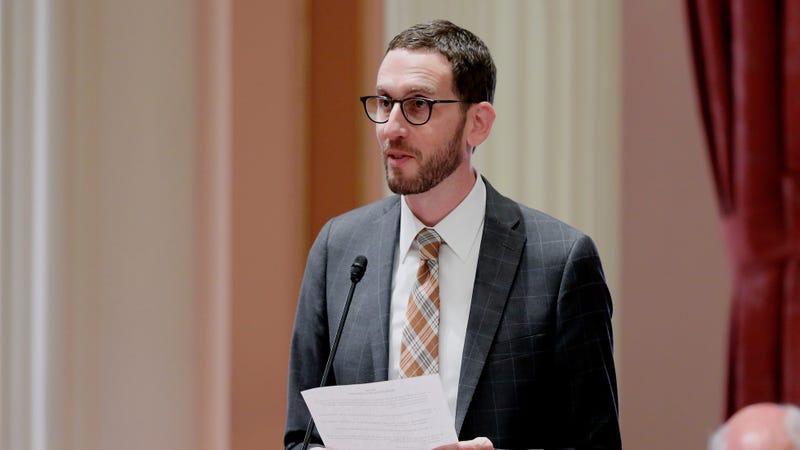 State Sen. Scott Wiener, D-San Francisco, addresses the state Senate, Thursday, Aug. 30, 2018. The Assembly approved Wiener’s net neutrality bill seeking to revive regulations repealed last year by the FCC that prevented internet companies from exercising more control over what people watch and see on the internet. Photo: AP
State Sen. Scott Wiener, D-San Francisco, addresses the state Senate, Thursday, Aug. 30, 2018. The Assembly approved Wiener’s net neutrality bill seeking to revive regulations repealed last year by the FCC that prevented internet companies from exercising more control over what people watch and see on the internet. Photo: AP
It’s happening.
After months of back and forth, amending bills, combining them, and pulling them apart, California’s legislature is poised to pass a law that will, at least for some 40 million Americans, restore the net neutrality protections annihilated by the Trump administration this year.
After clearing the state Assembly on Thursday, S.B. 822 received 23 “ayes” in the Senate, two more than is needed to pass. (At time of writing, the votes had yet to be locked in.) The bill, authored by State Senator Scott Wiener of San Francisco, will soon be on its way to Governor Scott Brown’s desk to await his signature or veto.
“We did it,” Wiener said. “We passed the strongest net neutrality standards in the nation. The internet is at the heart of 21st century life—our economy, our public safety and health systems, and our democracy. So when Donald Trump’s FCC decided to take a wrecking ball to net neutrality protections, we knew that California had to step in to ensure our residents have access to a free and open internet.”
“I am incredibly proud of the work we have done to protect Californians everywhere, who deserve equal and open to access to this modern day necessity,” he added.
Governor Brown has not signaled whether he intends to sign the bill, but supporters in the Senate remain optimistic, said a Democratic aide, noting that both U.S. Senators from California, Kamala Harris and Dianne Feinstein, had called for its passage. The bill is supported as well by Attorney General Xavier Becerra.
Despite its status as the nation’s most liberal state, the fight to reestablish net neutrality in California was not an easy one. The major broadband providers that fiercely oppose S.B. 822 hold enormous power in the Golden State. Nevertheless, the sway companies such as AT&T and Verizon have over lawmakers, in the end, could not compete with the torrential outpouring of support from California residents, who are equally fired up about this issue.
Inundated by calls and emails demanding protection from internet service providers that may seek to block or throttle online traffic at will, even legislators flush with telecom contributions were forced to relent. Although their votes were not needed, six Republicans on Thursday said “aye.”
“When California acts, the world pays attention,” wrote Stanford Law School professor Barbara van Schewick following the vote, adding: “This bill ensures that Californians, not the ISPs they pay to get online, get to choose what websites and apps they use.”
The result of Friday’s vote is a massive blow to an industry that has spent years combating efforts to curb its sovereignty over the delivery of online services. Democrats and Republicans alike watched the bill’s trajectory from afar with great interest, plenty unconvinced that net neutrality would be an issue remembered come November. Had a coastal bastion of progressivism like California been unable to pass a comprehensive bill that mirrors the Obama-era rules undone in December, many thought it could not be done anywhere else.
“We hope that other states can look to this legislation as a model for net neutrality standards,” Wiener told Gizmodo.
They undoubtedly will.
This is a developing story.